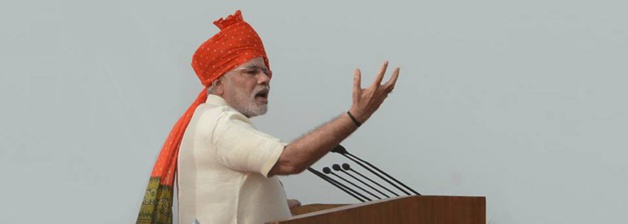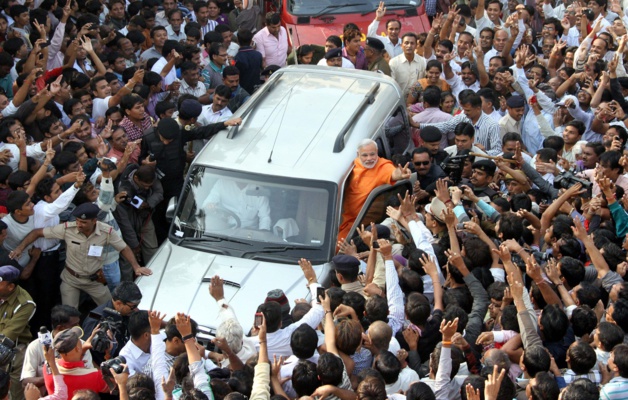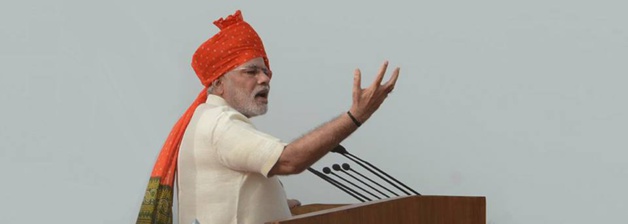
Credit AFP photo/Raveendran
During the campaign, the potential victory of Narendra Modi drew great media attention and raised concerns amongst some. Indians or foreigners, journalists, militants, writers and political scientists: everybody had something to say about the subject. Many have predicted a period of authoritarian power, and some have even gone as far as to mention fascism or the reverting back to the Emergency state - like during the period of Indira Gandhi, who suspended democracy in 1975 and 76.
You do not have to look far to find the origins of these concerns. Chief Minister of Gujarat from 2001 to 2014, Narendra Modi has been at the heart of a number of controversies, often provoked by his Islamophobic rhetoric. The politician was blamed in February 2002 for riots that broke out against the Muslims in Gujarat. In only a few weeks, almost 2000 people were found dead.
His administration had been accused of not combatting this violence, and in some cases of even encouraging it. He was also a member of the Rashtriya Swayamsevak Sangh (RSS), the National Volunteer Organisation, historically considered to be the ideological basis for the BJP. Openly inspired by European extreme right wing parties from the 1930s, this group aimed to replace the secular state with a Theocratic Hindu state. However, secularism is a core tenet of the Constitution of 1947, and almost 20% of the Indian population is not Hindu.
The Fortunate Man
If Narendra Modi has relied on core support from the Hindutvawadis (supporters of nationalist Hindu ideology) for the positions that he was known for for such a long time, more recently he has not only attracted support from those who vote for the BJP. The current Prime Minister has increased his electoral reach, so as to obtain a quasi-unanimity. His image of a self-made man, starting out as a tea vendor, has charmed the Indian people. But beyond this little anecdote, he is above all considered to be a man in touch with the people and someone who has awoken a new hope. Amanda, a young Indian worker in Dubai shared with us this new sense of optimism; “He is our only hope. If he cannot bring India onto the road of development, nobody can.”
When he was Chief Minister of Gujarat, Narendra Modi was known for having modernised the state and having revived its growth. A large number of citizens thus hope - as he promised - that such a model can be reproduced across the entire country. The economy has certainly grown over the last few years in India, but this has not resulted in an overall improvement of the conditions of life or in a reduction of inequalities; in fact the opposite is true. The frustration is thus at its peak, as is the dislike towards the traditional political class. The different governments succeeded each other, but none of them proposed fairer and more controlled models. Furthermore, one after the other, they have all been embroiled in cases of corruption.
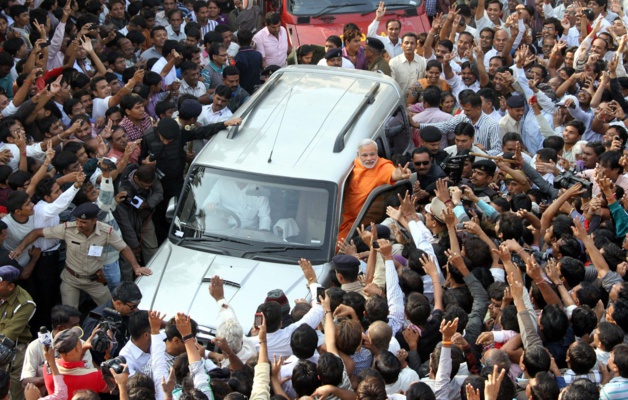
The main opposition candidate of the BJP in 2014, Rahul Gandhi, was not destined for a political career, but was finally chosen to represent the Party of Congress as part of the Nehru-Gandhi dynasty. The lack of credibility in his campaign left Narendra Modi standing alone in the arena. With a hyperactive disposition, he featured regularly in the media. By acknowledging the popular classes in his speeches and by proposing an alternative vision, he became the only option to end political inertia. It was thus that the Indian people took to the polling stations in their masses to vote for him as their next Prime Minister.
A Flawless Economic Recovery
The first months of Narendra Modi’s accession to power were characterised by an acceleration of India’s economic development. While the growth of the country did not match that of other emerging powers, the IMF has recently praised its current growth predictions, estimated at 7.2% and now larger that China’s.
Narendra Modi swiftly introduced strong measures leaning towards a liberalisation of the economy. The government is increasingly falling back on public-private partnerships in order to modernise infrastructure, and has recently announced the creation of 100 smart cities spread across the country. Foreign Direct Investment (FDI) regulations have also been relaxed, which increased to 3.5 billion dollars in July 2014, double the figure from July 2013. The political stance of the government clearly favours the business sector. It is through this economic activity that Narendra Modi is encouraging development in his country, and is earning him nicknames in newspapers like ‘The Indian Reagan’, or the ‘Deng Xiao Ping of Delhi’.
The easiest way to boost the economy is to simplify and ease regulations and administrative processes, which are currently very stringent in India, and so over the last few months the government has thus thrown itself into tackling bureaucratic delays.
Avoiding Environmental Issues
However, minimising bureaucracy to increase growth has also led to the neglect of environmental measures. For example, last August, the National Council of Flora and Fauna authorised almost 140 projects at a dizzying speed: the construction of a hydroelectric station, an ol, etc. Normally these approvals take more time and require inquiries. So how were they granted in such a short space of time? Digging a little further, several newspapers found the answer to this mystery: Within the Council, seats usually given to five environmental NGOs had been replaced by an environmental agency, dependent on the State of Gujarat.
Journalist V. Nilesh, author of Deccan Chronicle, explained to us that the ecological resources have been used up for projects that look good, but are not well thought out. “Modi has monopolised the public space with his main project “Swachh Bharat Abhiyan” (Clean India Campaign), into which he has poured millions of rupees. Is it really necessary for the government to launch such a cleanliness campaign, when it is a municipal responsibility? At the same time, the government has considerably reduced spending on education, and now finds itself at the mercy of private companies to finance the installation of toilets in public schools, in the name of the Swachh Vidyalaya (Clean Schools) campaign. These same companies have benefited from tax breaks of around 95 billion rupees in 2014-15!”
Those left behind by Growth
The success of economic development policies has not benefited every sector. For example, the Central Bank’s two interest rate decreases this year have still not helped small companies to take out loans. Although these new economic policies favour multinational companies and foreign investors, they have not had a great impact on local businesses. Furthermore, the agricultural sector, which employs 53% of the working population, is in dire straits. In the 2015-16 budget however, the money allocated for agriculture was cut by 50 billion rupees.
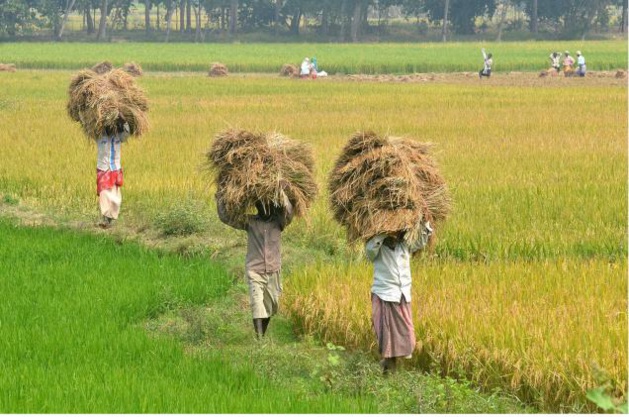
Some have highlighted the lack of visible changes in the lives of those who need it the most. Last November, for example, Narendra Modi visited Varanasi, the city from where he is an MP. Eagerly anticipated, he left the city leaving many disappointed: Mayawati, head of the State of Uttar Pradesh, criticised him, saying: “Instead of taking concrete measures for the benefit of the poorest people, he continues to blow his own trumpet… But his populist promises will not change things by themselves, and something more concrete must be done for the people at the bottom”.
It is likely this neglect of issues which directly affect the people that led to the warning that Modi received in Delhi on the 10th February. Although the BJP was expecting to win the local legislative elections in May, the party suffered a major defeat against a new anti-corruption party, the Aaam Aadmi Party (The Ordinary Man’s Party). It is essential for the party in power to hold the capital city, and this defeat threw a spanner in the works for Modi’s government.
“Since his election, Narendra Modi has promised to create more employment and stimulate economic growth. But many areas in the capital are still lacking water and working drainage systems. Electricity is too expensive for poorer families and the safety of women in Delhi is not guaranteed. Modi has not offered any solutions to these issues”, explained Adnan Farooqui, Professor of Political Science at the University of Jamia Millia Islamia in Delhi, in the Belgian paper, La Libre.














